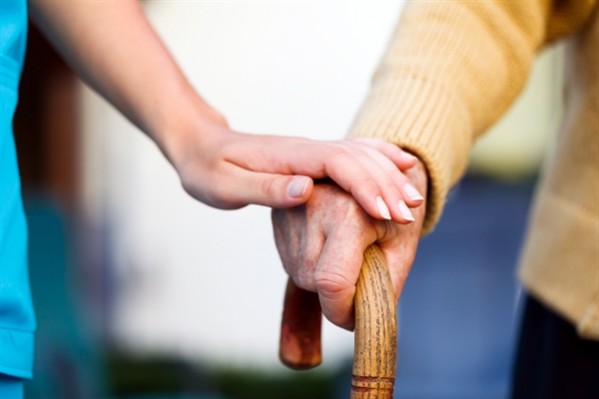Stress, fatigue and burnout are significant challenges for many who take care of their aging loved ones. According to AARP, as many as one in three family caregivers report high levels of stress.
Often, caregiving becomes a full-time job for spouses or adult children — especially if the senior they’re looking after has Alzheimer’s, dementia or age-associated memory loss.
If you’re a family caregiver, you need to be cognizant of the signs that you’re getting overwhelmed.
Each person reacts to the stress of caregiving in unique ways
If you’re a stressed caregiver, you might feel unable to relax, or worry all the time. You might feel tired in the daytime, lie awake at night or sleep too much.
You might binge eat and gain unhealthy weight. Or you might lose appetite and experience unhealthy weight loss.
As many as one in three family caregivers report high levels of stress.
You might experience frequent headaches or body aches, both of which are often caused by muscular tension. Stress can also run your immune system down, so you might find yourself catching colds or other illnesses more often than usual.
You could become easily irritated or experience bursts of irrational anger. You might feel sad or joyless. Some stressed-out caregivers abuse alcohol, prescription medications, or illicit drugs, or thinking about harming themselves or others. These are all red-flag warnings that you’re overwhelmed and need help.
If you’re a family caregiver for senior living in Louisville, know that there are many resources available to you to help ease the physical, mental, financial, emotional and spiritual strains you face. And remember, you’re not alone.
Today, let’s talk about some of the ways you can cope with caregiver fatigue
1. Carve out time for yourself
If you’re not at your best, how can you provide the best care for your senior loved one? Many caregivers make the mistake of focusing solely on their older relative’s needs, and neglecting their own.

You need some alone time — daily, if possible. Don’t be afraid to ask others for help. If you have siblings, other family members, or family friends living close by, ask them for assistance in developing a caregiving rotation or a regular visiting schedule that would allow you to take time to take care of you.
It could be as simple as figuring out who is taking your mom out for the afternoon which day of the week. You could develop a routine in which your dad resides with you most of the time, but stays at a sibling’s home for a few days every other week.
Pay attention to the way you feel. If you’re overwhelmed, reach out
2. Hire in-home care
Loved ones with dementia often need help in the bathroom and with dressing. They might need someone to cook and clean for them, to help them stay on top of their medication regimens, or to shuttle them to doctor appointments.
Hiring a patient care assistant (PCA) or nurse, who could provide such services in your home, could help. Although custodial care isn’t typically covered by traditional Medicare, it is sometimes covered by private supplemental plans or Medicaid (depending on needs).
By bringing a home health care provider in, even part-time, you could gain you the space you need to take care of yourself. If you aren’t sure where to start, contact a local Aging Life Care™ Professional for expert guidance.
3. Consider adult day care programs in your area
Adult day care programs are safe socialization spaces where caregivers can bring their loved ones during the daytime, allowing caregivers to keep working, to run errands and perform their usual household chores, or just to have some regular alone time.
In Kentucky, some adult day care programs are licensed, through the Office of the Inspector General, as “adult day health centers,” which provide continuous supervision of participants' medical needs. Such centers often provide memory care, physical therapy, occupational therapy and other wellness services.
For help in locating a licensed adult day health center in the Louisville area, call the KIPDA Area Agency on Aging and Independent Living at 502-266-5571, or click here to see listings on the Cabinet for Health and Family Services website
4. Book your loved one for a respite care stay at a retirement community
If you’re a full-time family caregiver for a senior who can’t safely travel long distances, what do you do when you need to go out of town on business or for an emergency? What happens if you just need a good, old-fashioned vacation?
Respite care may help.
Many retirement communities, including Episcopal Church Home, allow seniors to temporarily stay and receive the socialization and medical support they need while their family caregivers are away. Respite stays can last a few days to several weeks. They’re an excellent tool you can use to cope with caregiver fatigue and avoid burnout.
It doesn't have to all fall on you
Caring for an aging parent can feel isolating. If you’re feeling overwhelmed, remember that you don’t have to shoulder the whole burden of care. Ask others for help, and take advantage of all the community resources available to you.
And, if the time comes that it’s no longer feasible for you to provide full-time, in-home care for your elder loved one, residential care at Episcopal Church Home may be the right choice for your family.
Click here to find out more about the seniors who are living well right here in our beautiful Louisville retirement community.
Learn more about Episcopal Church Home’s person-centered approach to senior care.
If your older loved one needs residential retirement care in Louisville, we’d love to show you the difference holistic care can make in seniors’ overall well-being.
Click here to learn more about our senior services — from assisted living to residential memory care — then come take a tour of our Kentucky retirement community.













